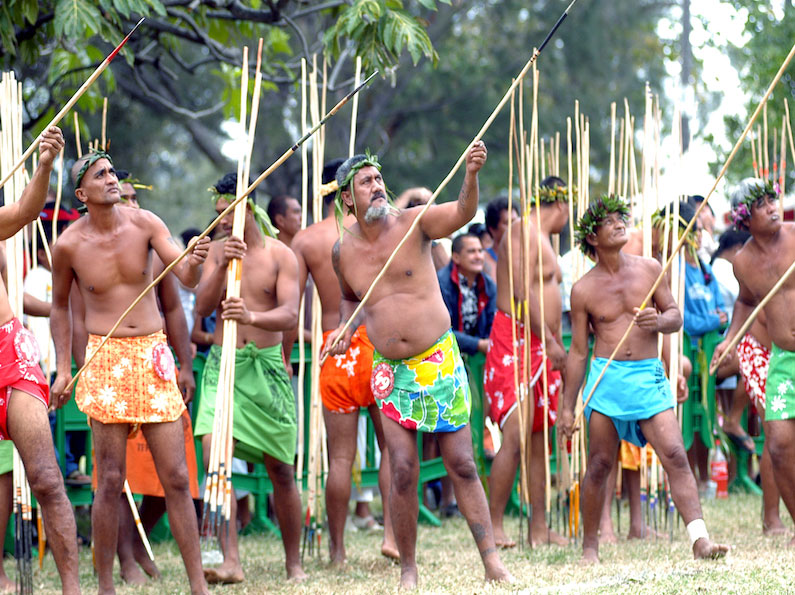
Tiurai and Heiva, July festivities in Tahiti & her islands

The historical fact of the rescue of an important part of the culture of Tahiti and her islands thanks to the conjugation of the festivals of July 14 and the Tiurai, from 1881
Often, it does not take much for the good events to happen or not … Just a detail, a fortuitous fact that ends up changing everything, for evil or for good. Obviously, this has been the case for a large part of the Polynesian culture that seems to owe its survival to a favourable chance or to some good stroke of luck… But was it really a stroke of luck? Or should we view it in retrospect as the happy result of a royal political action of astonishing resourcefulness?
Would it be a paradox of colonial history that the French national holiday of July 14 indirectly allowed the culture of Tahiti and her islands to survive, escaping obsolescence, oblivion and dereliction? … With more than 130 years passed since then, we are now able to bring pertinent answers to that long-time-pending question and might well be tempted to say yes … Indeed, the bulk of Tahitian culture including dances and traditional sports, must surely owe its survival to the discernment and the visionary initiative that Queen Pomare IV had in 1881, in dedicating the festivities of Tiurai to the French Republic on the occasion of the very first celebration of July 14 in Tahiti. Doing so, she delivered a highly subtle message bringing both the vow of allegiance to France and the politically correct affirmation of the Polynesian cultural difference …
It is not surprising that the Tiurai played a unifying role on this occasion, just like it had been doing so many times during the pre-colonial history of Tahiti. Indeed, the Tiurai event had always allowed the Tahitian monarchs to federate the archipelagos, despite their strong particularisms and even their dissensions. So why not also applying the winning recipe to the occupier? In any case, that winning recipe did work and in this, the Queen showed the history that she had well remained the Queen… For she finally dominated the situation, to an extent she proved being capable to somehow “federate” the French Republic around the culture of her people, thus saving that unique culture from the threat of some probable and imminent disappearance…
It was on July 14, 1881 that everything got played out: on that day, the French national holiday of July 14 was celebrated for the first time in Tahiti and was to be celebrated every year from that date. According to the wishes of Queen Pomare, this first celebration of July 14 took place at the same time as the traditional local festivals of July. The two events happened to interact powerfully in an unprecedented festive symbiosis, uniting the cultures of both the occupier and of the natives. So were born the very first festivities of “Tiurai” (which means “July” in Tahitian by derivation from the English word “July”).
From 1881 to until 1985, the Tiurai celebrations were maintained and their popularity got immense at the scale of Tahiti and her islands: The festivities were offering horse racing, military parades and balls organized by the colonial administration, on the one hand; and the local sporting and cultural events, then essentially constituted by war dances (“ote’a”), traditional songs (“himene”), canoe races and traditional sports games, on the other hand. The Tiurai and July 14 ended up representing a little the “same” festivities and celebration in the local collective unconscious. The two events were each year, lived in the wake of each other, in the euphoria of festivities taking place throughout the month of July. Over time, the Tiurai had become some sort of an annual “summit” of the communion of cultures. It marked the time for conciliations and reconciliations, as well as the simple acceptance of the “other”…
In 1985, one year after Tahiti and her islands accessed to internal autonomy, the Tiurai was renamed Heiva to mark both its refocusing on the differentiation and valorisation of the Polynesian cultural identity and the break with the old Tiurai spirit that once wanted these festivals to be given in the honour of France.
It is therefore within that spirit of cultural ecumenism that an important part of the culture of Tahiti and its islands has been able to survive. In the good old times, the Tiurai was giving the Polynesians the opportunity to subtly express both their allegiance to France and their cultural difference. But the Heiva bears a noticeable evolution in the way our populations adhere to this major cultural event: over time, the Tiurai had ended up expressing mainly the Polynesian cultural difference. But the Heiva marks the time to go beyond this single need for differentiation in favour of the expression of a fully-fledged Polynesian identity that no longer seeks to offer itself to France nor to differentiate itself from France …
















